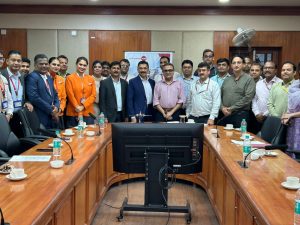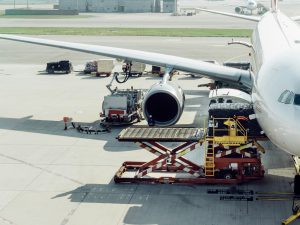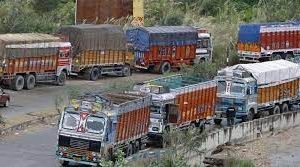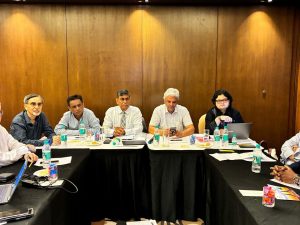Air India SATS Airport Services (AISATS) has become the first ground handling company in India to be awarded the newly mandated Safety Clearance by the Directorate General of Civil Aviation (DGCA). This landmark achievement positions AISATS as a pioneer in aviation safety and operational excellence and underscores India’s emergence as a global leader in aviation standards. The DGCA introduced this mandate in line with International Civil Aviation Organisation (ICAO) recommendations, requiring ground handlers to demonstrate robust Safety Management Systems (SMS), risk controls, staff training programs and infrastructure readiness. This mandate was in response to increasing air traffic and the need for standardised safety protocols, DGCA introduced mandatory safety clearance requirements for Ground Handling Service Providers (GHSPs). Under the new Civil Aviation Requirements (CAR), GHSPs must appoint accountable managers, station managers and safety and quality managers, while ensuring recurrent training for ground personnel. With this regulation, India becomes the second country globally to formally regulate ground handling services. AISATS has become the first and only Ground Handler in India to receive the Safety Clearance Certificate No. GHSP/001, issued by DGCA under these newly established safety regulations. This milestone follows months of rigorous documentation review and operational inspections conducted by DGCA across all AISATS-managed airports. The Quality Management, Risk and Compliance and Safety teams at AISATS developed a comprehensive suite of Operations and Training Manuals, which were highly commended by DGCA officials for setting a new industry benchmark. Ramanathan Rajamani, CEO, AISATS, “We are honoured to be the first ground handler in India to secure DGCA’s Safety Clearance. Safety and quality have always been the cornerstone of AISATS’ operations. This recognition reflects our strong culture of accountability, continuous training and operational excellence.”
Read More »IATA records 5.5 % rise in global air cargo demand in July 2025
According to the International Air Transport Association’s (IATA) latest report, there has been a 5.5 per cent increase in global air cargo demand in July 2025 compared to the same month in 2024, with international operations up 6.0 per cent. Capacity also rose by 3.9 per cent year-on-year. Willie Walsh, IATA’s Director General, said, “Air cargo demand grew 5.5 per cent in July, a strong result. Most major trade lanes reported growth, with one significant exception of Asia – North America, where demand was down 1.0 per cent year-on-year.” He added, “A sharp decline in e-commerce, as the US de minimis exemptions on small shipments expired, was likely offset by shippers frontloading goods in advance of rising tariffs for imports to the US.”
Read More »Dachser expands its service portfolio across APAC region
Dachser has expanded its service portfolio across the Asia Pacific (APAC) region. Through the expansion, Dachser Air & Sea Logistics (ASL) APAC, further strengthens its position to support the region’s growing market demands. Leveraging its deep industry expertise and robust multimodal network, Dachser offers an integrated end-to-end supply chain solution for wine and spirits businesses operating between Europe and APAC. The offering combines air and sea freight services with the well-established European network of Dachser Road Logistics, delivering efficiency, reliability and product integrity from origin to destination. The APAC wine and spirits market is expected to grow at a CAGR of 5-6% until 2030, driven by rising consumer demand and expanding trade. “The region presents significant opportunities for Dachser to apply our established expertise in wine and spirits logistics,” said Roman Mueller, Managing Director for Air & Sea Logistics Asia Pacific at Dachser. “At Dachser, we understand the unique needs of our customers and are committed to delivering wine and spirits with excellence, ensuring customers experience a first-class journey from European wineries to markets across APAC.”
Read More »ATMA urges to reduce GST to streamline logistics ops
The Automotive Tyre Manufacturers Association (ATMA) has called for a reduction in Goods and Services Tax (GST) on tyres, arguing that the current rate of 28 per cent, the highest slab, burdens vehicle operators and inflates logistics costs across sectors. ATMA said lowering GST on tyres would directly cut vehicle operating expenses, particularly in the commercial segment and benefit farmers, small traders, service providers, as well as infrastructure and mining industries. At present, all major categories of automotive tyres attract 28 per cent GST, while tractor tyres and aircraft tyres are taxed at 18 per cent and 5 per cent respectively. In a representation to the Union Finance Minister, ATMA stressed that tyres are fundamental enablers of mobility across trucks, buses, passenger cars, two and three-wheelers, tractors and construction and mining equipment and should not be taxed on par with luxury goods.
Read More »Cathay Cargo gets re-certified for IATA’s Lithium Batteries accreditation
Cathay Cargo has been re-certified for IATA’s Center of Excellence for Independent Validators (CEIV) Lithium Batteries accreditation. The certification offers reassurance for customers using the Cathay Dangerous Goods service, which provides customers with precise handling and segregated storage across all nine classes of dangerous goods, including flammable, radioactive and other types of hazardous materials, along with the safe carriage of lithium-ion batteries. Cathay Cargo first achieved IATA’s CEIV Lithium Batteries accreditation in 2023. “Safety is the cornerstone for all our operations and particularly when it comes to the transport of dangerous goods,” said Tim Wong, GM, Cathay Cargo. He added, “The safe carriage of lithium-ion batteries is a core focus of our cargo business and we have introduced a series of safety protocols with our customers and operational teams to mitigate any risks. This CEIV reaccreditation will give further reassurance to our customers that we adhere to the highest standards of handling in the industry.”
Read More »Softlink Academy, Sitara Shipping sign MoU to create skilled workforce
Softlink Academy, the skill development arm of Softlink Global, has signed MoU with Sitara Shipping to strengthen talent development and internship opportunities in logistics and shipping. The agreement focuses on deploying industry-ready professionals trained in digital logistics, bridging the gap between education and employment. Through this collaboration, Softlink Academy will provide hands-on, practical training in logistics technology, while Sitara Shipping will facilitate real-world exposure and career opportunities across its business operations and network. The initiative ensures that MSMEs and large enterprises gain access to skilled professionals who can drive digital adoption and efficiency in logistics and shipping. Amit Maheshwari, Founder & CEO of Softlink Global, said, “At Softlink, we have always believed that the future of logistics rests on the strength of its people. This MoU is a step forward in ensuring that the next generation of professionals are equipped with the right digital skills to succeed. By linking skill development to industry demand, we are not only creating employable talent but also supporting businesses to thrive in a fast-evolving ecosystem.”
Read More »India, Japan build ties to strengthen trade
Prime Minister Narendra Modi, during his recent visit to Tokyo, oversaw the signing of 13 MoUs aimed at strengthening India-Japan cooperation across key sectors. The agreements span security, space, clean energy, human resource exchange, digital partnership and environmental collaboration. Both nations also unveiled an India-Japan Joint Vision for the Next Decade along with a Joint Declaration on Security Cooperation. Notable pacts included an action plan for human resource exchange and an implementing arrangement between ISRO and JAXA on joint lunar polar exploration. Further agreements were inked on clean hydrogen and ammonia, as well as a statement of intent between India’s Ministry of Science and Technology and Japan’s MEXT. As part of his day-long programme, PM Modi also engaged with business leaders and cultural representatives. Emphasising the State-Prefecture Partnership Initiative introduced at the 15th India-Japan Annual Summit, he urged Indian states and Japanese prefectures to collaborate in trade, technology, tourism, manufacturing, start-ups, mobility and SMEs, reinforcing bilateral ties on both strategic and grassroots levels.
Read More »ACAAI holds meet to finalise convention roadmap
The Managing Committee of ACAAI met on 26th August 2025 in Mumbai, where the key agenda for the upcoming 49th ACAAI Annual Convention, to be held from 6th to 9th November 2025 in Bali, Indonesia was discussed. It was also decided to approach the members to make the convention a success by participating in large numbers.
Read More »CargoAi unveils CargoCoPilot Agent to enhance efficiency
CargoAi announced the CargoCoPilot Agent — Unified AI for air cargo, a conversational AI that works across WhatsApp, email, airline websites and their own CargoMART platform to streamline everyday workflows for airlines, GSAs and freight forwarders. The Agent handles common customer requests end‑to‑end — from AWB‑based tracking and rate & capacity search to automated booking and instant answers — cutting manual back-and-forth and speeding up responses industry‑wide. The CargoCoPilot Agent is the next evolution of CargoAi’s AI portfolio, building on years of investment and proven products such as the CargoCoPilot AI Outlook Plugin, CargoCoPilot via API and AI‑Powered Rates inside CargoMART. This launch represents a step‑change in capability: a single, secure AI interface that understands any language and meets customers wherever they work. “AI must feel natural, trustworthy and useful from day one. With CargoCoPilot Agent, a forwarder can simply ask ‘Show me rates to JFK’ or “Where is my shipment?” — and the Agent does the rest,” said Matt Petot, CEO at CargoAi. “CargoAi is not experimenting with AI — we are deploying it live, at scale and with measurable business value. With these new developments we are targeting to automate not less than 50% of emails interactions received by our industry, making room for higher valued tasks.”
Read More »Cargo Flash, EgyptAir Cargo implement ‘nGen’ ICMS to boost ops
Cargo Flash Infotech has partnered with EgyptAir Cargo to implement the advanced ‘nGen’ Integrated Cargo Management System (ICMS). This partnership represents a significant milestone in EgyptAir Cargo’s digital transformation journey, aimed at modernising cargo operations and enhancing service delivery across its international network. Developed by Cargo Flash, the nGen ICMS is a comprehensive, cloud-based solution designed to replace legacy systems with a unified digital platform. It automates end-to-end cargo processes — including booking, documentation, warehousing and final delivery — while providing real-time visibility, operational accuracy and seamless integration across the cargo value chain. Jasraj S Chug, Co-founder and Director, Cargo Flash Infotech said, “Our collaboration with EgyptAir Cargo is a strategic alignment of vision and capabilities, focused on driving digital excellence in the air cargo industry. The implementation of our nGen ICMS will enable EgyptAir Cargo to optimise operations, enhance transparency and scale efficiently in a competitive global landscape. The successful implementation of nGen ICMS was led by Neha Kumari, Vice President SaaS Products, Cargo Flash.
Read More » Cargo Breaking News
Cargo Breaking News








